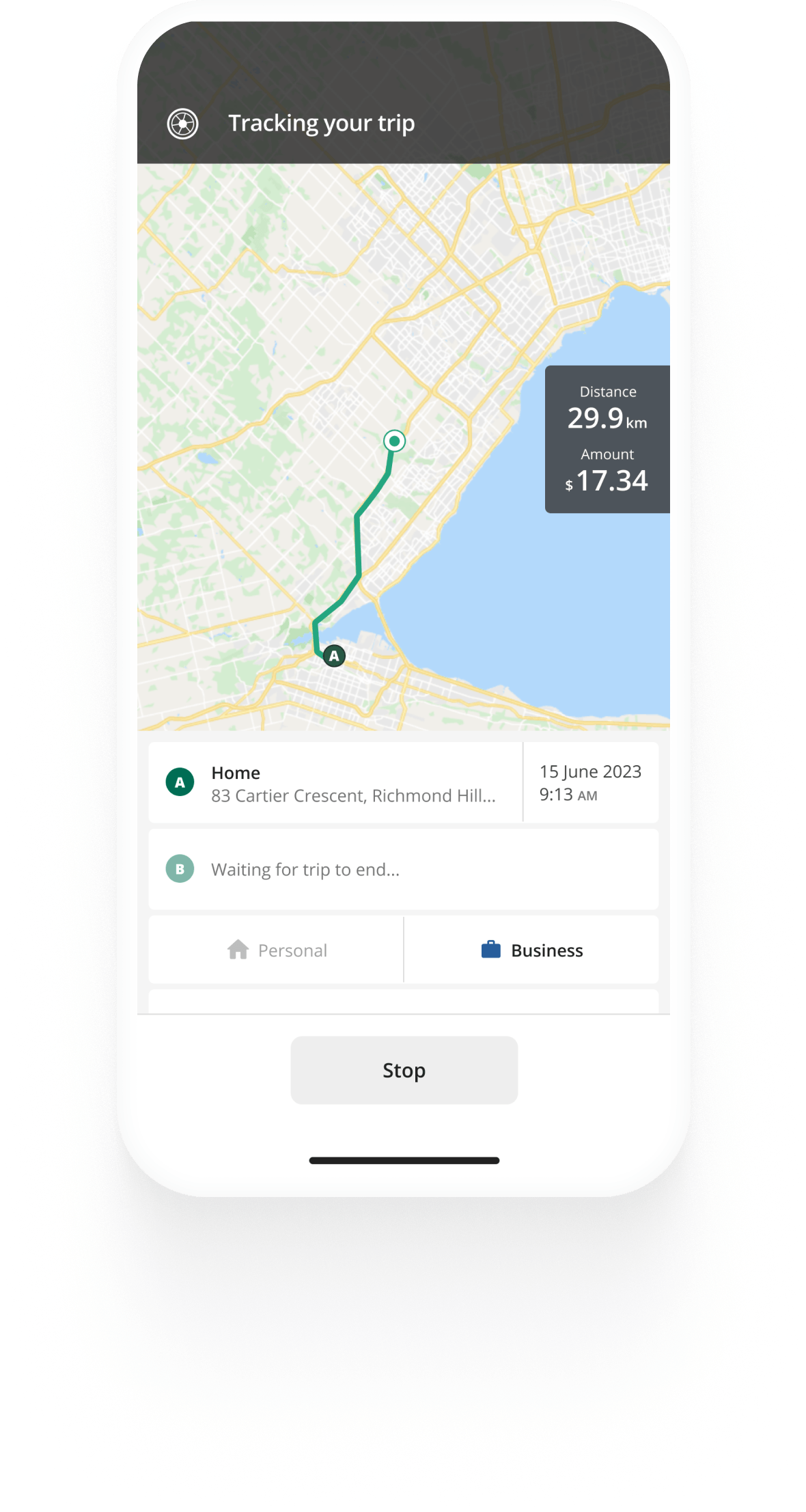Track mileage automatically
Get startedSmall Business Tax Credits You Can Claim in Canada
Self-employed and small business owners in Canada can take advantage of various tax credits to lower their tax burden. But with so many different credits available, knowing what you can claim can be challenging.
This article explains how tax credits work and lists several common self-employed tax credits for small business owners.
Tax credits vs. tax deductions
Tax credits and tax deductions can reduce the amount of taxes you owe, but they work differently. A tax credit is an amount you subtract from your taxes owing, dollar for dollar. In contrast, a tax deduction lowers your taxable income by a specific amount, which indirectly reduces your taxes owing.
Using 2024 personal income taxes as an example, the Basic Personal Amount is a non-refundable tax credit that lowers taxes due to zero on the first $15,705 of income earned.
Meanwhile, the RRSP deduction is one of Canada's most common personal tax deductions. It reduces a person’s taxable income by their RRSP deduction amount.


Track business driving with ease
Trusted by millions of drivers
Automate your logbook Automate your logbook

Automatic mileage tracking and CRA-compliant reporting.
Get started for free Get started for freeKey tax credits for self-employed and small business owners
In addition to personal tax credits you may already be familiar with, many tax credits are available for self-employed and small business owners in Canada. We’ve compiled a list of some that may benefit you.
Federal tax credits for corporations
Over a dozen federal corporate tax credits are available, which you may qualify for if you file a T2 Corporation Income Tax Return. Here are a few noteworthy ones:
Canada Carbon Rebate for Small Businesses: This refundable tax credit is available to Canadian-Controlled Private Corporations (CPCCs) to offset the cost of federal fuel charges.
Canadian Film or Video Production Tax Credit: This refundable tax credit, jointly administered by the Department of Canadian Heritage and the CRA, promotes Canadian programming and film and video production in Canada. Eligible businesses can qualify for a tax credit of 25% of qualified labour expenses.
Scientific Research and Experimental Development tax incentives (SR&ED): The SR&ED are actually two incentives, including a deduction and a tax credit. They are available to eligible corporations, individuals, trusts, and partnerships involved in scientific research and experimental development.
Gasoline and fuel-based tax credits
Refund for Ontario gasoline tax paid for unlicensed equipment: If you own an Ontario business that used gasoline in unlicensed farm, construction, or manufacturing equipment, you may be eligible for a refund of gas taxes paid.
Refund of gasoline tax for a power take-off in Ontario: If your business uses auxiliary equipment that’s been added to a licensed motor vehicle, such as a cement mixer, power vacuum, or aerial bucket, you may be eligible for a refund on the fuel taxes paid to operate that equipment.
Tax refunds on fuel in Yukon: Eligible business owners in the Yukon can apply for two types of fuel tax refunds: Fuel used for permitted activities and space heating. Permitted activities include farming, fishing, sawmills, and golf course operations.
Commission for gasoline and propane sold in Saskatchewan: Saskatchewan service stations and bulk fuel dealers near the Alberta or Manitoba borders can receive a competition assistance allowance on eligible fuel purchases, sales, and deliveries.
Apprenticeship, co-op, and trainee tax credits
Apprenticeship Job Creation Tax Credit (AJCTC): This non-refundable tax credit provides $2,000 annually for each eligible apprentice hired by a business in Canada.
Paid Work Experience Tax Credits (PWETC) Manitoba: Eligible employers in Manitoba can receive a percentage of wages and salaries paid to certain trainees and recent graduates through tax credits.
British Columbia Apprentice Training Tax Credit for Employers: British Columbia businesses can receive refundable tax credits for employing apprentices enrolled in eligible apprenticeship programs. The credit is open to sole proprietorships, partnerships, and corporations.
Ontario Co-op Student Tax Credit: This refundable tax credit is designed to provide co-op work placements for post-secondary students in Ontario. Businesses can receive a credit of up to $3,000 per work placement.
Tax Credit for Quebec Businesses With Trainees: The Province of Quebec provides a refundable tax credit to qualifying businesses that incurred expenses related to student trainee or work apprenticeship programs.
The Government of Canada’s Business Benefits Finder has over 80 tax credits on its website, so it’s a good idea to look at the list to ensure you are aware of all the credits you may qualify for. For example, you can find additional tax credits for investing in startup companies, book publishing, media and film production, agriculture, etc. You can narrow it down to see which one is suitable for you.
In addition to tax credits, your business can save money on taxes by tracking and claiming your mileage. Of course, you’ll need to keep accurate records as evidence of your miles logged. You can do this yourself or automate the process using a mileage tracking app.
Refundable and non-refundable tax credits: What’s the difference?
Some tax credits are refundable, meaning you will receive the credit even if you don’t owe taxes. The Canada Carbon Rebate for Small Businesses is an example of a refundable tax credit. Non-refundable tax credits, such as the Apprenticeship Job Creation Tax Credit, can reduce your taxes owing to zero but cannot produce a refund.
FAQ

Tired of logging mileage by hand?
Effortless. CRA-compliant. Liberating.
Small Business Tax Guide
- How Much a Small Business Can Make Before Paying Taxes
- Small Business Tax Rates
- GST/HST for Small Businesses
- Small Business Tax Deductions in Canada
- Small Business Tax Credits
- Business-Use-of-Home Expenses
- How Long You Should Keep Business Records
- Managing Prepaid Expenses
- Self-Employed Tax Breaks
- Self-Employed and Small Business Tax Dates